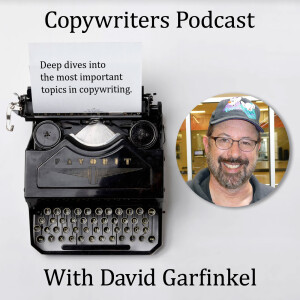
Emotions make the world go round.
One particular emotion, and that’s love -- according to the late singer-songwriter from the 60s, Deon Jackson, love is the emotion that makes the world go round most of all.
But there are 11 other emotions that make the world go get their credit cards and push the order button.
It’s conventional wisdom among a lot of copywriters and marketers that there are only two emotions that do that: greed, and fear.
But today we’re going to show you others, that you can use in your copy. We think you’ll be surprised, and by the end of today’s show, you’ll agree with us. You’ll see that each of these emotions, when presented in the right way to your prospect, demands action. And action is what it’s all about.
We only had time for half the list last week, so we’ll do a part 2 today and get the other half.
Now, embedded in the word “emotion” is the word “motion,” and that’s not just a bunch of lame wordplay. It’s important, because people rarely take action -- that is, they rarely go into motion -- without the motivation of emotions pushing them.
And direct response copywriting is all about getting people into motion. If we can understand these emotions well enough to spur them in our prospects, then we stand a chance of making more sales.
What’s more, by giving your prospect copy that lets them experience these emotions in relation to how your copy helps them, you make reading your copy a more meaningful experience for them. That’s really important.
The list comes from this book by one of David’s favorite writers, Intelligence in the Flesh by Guy Claxton. Guy is a very clear-seeing professor in the UK and he writes about the brain, learning, creativity and in this book, as well, some new insights about the body-mind connection.
The list of emotions he put together are drawn from the lifetime work of two geniuses: Professors Paul Ekman from University of California, San Francisco, and the late Jaak Pankseep of Bowling Green University. Just as important, everything about these emotions in the book rings true to me after 30 years in direct-response copywriting.
Each of the emotions starts somewhere… has a predictable path… and has an ideal goal at the end, where the emotion is resolved. These emotions don’t stand still. But each of them bugs the person who has that emotion and won’t resolve until the person does something about it.
I want to reiterate that happiness is what our prospects want, and if you honestly believe that your product or service can lead to happiness, then you owe it to your prospects not only to tell them, but also to show them by letting them experience the emotional change they want in real life, but first in their imaginations.
book: Intelligence in the Flesh, by Guy Claxton
https://www.amazon.com/dp/B01344K3O6
Download.
More Episodes
TikTok Secrets, with Emmanuelle Daigle
 2022-06-27
2022-06-27
 2022-06-27
2022-06-27
The 4 Kinds of Proof
 2022-06-20
2022-06-20
 2022-06-20
2022-06-20
Let’s Talk Conversational Copy
 2022-05-30
2022-05-30
 2022-05-30
2022-05-30
Branding That Increases Sales
 2022-05-23
2022-05-23
 2022-05-23
2022-05-23
Copywriting for Life, with Rabbi Evan Moffic
 2022-05-09
2022-05-09
 2022-05-09
2022-05-09
The 5 Lightbulbs of Copy, with Billy Broas
 2022-04-11
2022-04-11
 2022-04-11
2022-04-11
Kevin Rogers: Humor In The Era Of 'Woke'
 2022-04-04
2022-04-04
 2022-04-04
2022-04-04
What You Need To Change To Write Copy
 2022-03-28
2022-03-28
 2022-03-28
2022-03-28
The King of Advertorials, with Justin Brooke
 2022-03-07
2022-03-07
 2022-03-07
2022-03-07
Warming Up To Write Copy
 2022-02-21
2022-02-21
 2022-02-21
2022-02-21
012345678910111213141516171819
Create your
podcast in
minutes
- Full-featured podcast site
- Unlimited storage and bandwidth
- Comprehensive podcast stats
- Distribute to Apple Podcasts, Spotify, and more
- Make money with your podcast
It is Free
- Privacy Policy
- Cookie Policy
- Terms of Use
- Consent Preferences
- Copyright © 2015-2024 Podbean.com





